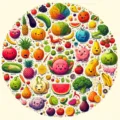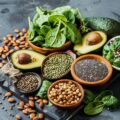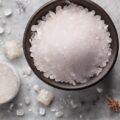Getting enough high-quality sleep is essential for overall health and wellbeing. However, many people struggle to fall asleep and stay asleep throughout the night. While practices like limiting blue light exposure and establishing a calming pre-bed routine can promote better sleep hygiene, your diet also plays an important role.
In this article, we’ll explore research-backed foods and nutrients that can enhance sleep quality when consumed regularly. We’ll also bust some myths around commonly avoided foods thought to interfere with sleep.
Foods That Help You Sleep
Tart Cherry Juice
Tart cherry juice contains high levels of melatonin, the hormone that regulates sleep-wake cycles. Studies show that drinking one cup of tart cherry juice per day can significantly increase time spent asleep and sleep efficiency.
Chamomile Tea
Chamomile tea has been used for centuries as a natural sleep aid. Modern research indicates the apigenin, an antioxidant in chamomile, binds to specific receptors in the brain that promote sleepiness and reduce insomnia.
Kiwi
Kiwis are rich in antioxidants and serotonin, a brain chemical that converts to melatonin at night. Consuming 2 kiwis 1-2 hours before bedtime can help you fall asleep faster and wake up less throughout the night.
Pistachios
Pistachios contain high levels of melatonin, magnesium, and vitamin B6, all of which support quality sleep. One study found eating pistachios daily for 3 weeks increased sleep efficiency and decreased wake after sleep onset.
Oatmeal
Oats eaten before bed increase sleep hormone melatonin. This whole grain also contains magnesium and phosphorus to relax muscles. Try topping oatmeal with banana slices and cinnamon for an optimal bedtime snack.
Nutrients for Better Sleep
Tryptophan
Tryptophan is an amino acid used by the brain to produce melatonin and serotonin. Foods like milk, eggs, fish, poultry, cheese, and seeds are high in tryptophan. Eating tryptophan-rich foods for dinner can boost sleep hormones at bedtime.
Magnesium
Magnesium relaxes muscles for restful sleep. Spinach, pumpkin seeds, almonds, avocado, and black beans are excellent plant-based magnesium sources. Consider a magnesium supplement if your levels are low.
Calcium
Getting enough bioavailable calcium can prevent nighttime muscle cramps that disrupt sleep. Include dairy products, leafy greens, oranges, and chia seeds in your diet for easily absorbable calcium.
Vitamin B6
Vitamin B6 helps convert tryptophan to serotonin and melatonin. It’s found in chicken, beef liver, pistachios, tuna, potatoes, and bananas.
Omega-3 Fatty Acids
Omega-3s boost serotonin release in the brain for better sleep regulation. Fatty fish like salmon and plant oils like flaxseed oil are excellent sources.
5 Myths About Foods That Disrupt Sleep
Does drinking coffee at night prevent sleep?
For most people, avoiding coffee after 2 pm prevents sleep interference. Some coffee drinkers have a genetic mutation allowing them to metabolize caffeine quickly without sleep disruption.
Do spicy foods consumed at dinner lead to insomnia?
Spicy foods themselves do not affect sleep quality or quantity, according to research. However, they can cause indigestion, which could make falling asleep uncomfortable.
Will eating chocolate before bed keep you awake?
Despite its caffeine content, moderate chocolate intake doesn’t impact sleep for healthy adults. Chocolate even contains sleep-supporting theobromine and antioxidants.
Can cheese eaten close to bedtime cause vivid dreams or nightmares?
No evidence suggests cheese affects dreams or sleep quality. Any food causing indigestion could disrupt sleep, however.
Can greasy fast food interfere with getting good sleep?
Heavy, fatty meals may cause indigestion, heartburn, and stomach pain interfering with sleep. But generally, fast food likely only impacts sleep if it upsets your digestion.
The Takeaway
Focusing on sleep-promoting foods and nutrients through your diet is an effective, natural way to achieve higher quality shut eye without relying solely on sleeping pills. Tart cherry juice, chamomile tea, kiwi, pistachios, and oatmeal are great options before bed. Meanwhile, nutrients like tryptophan, magnesium, calcium, vitamin B6, and omega-3s support sleep regulation. Avoid heavily spiced or greasy meals close to bed to prevent indigestion.









